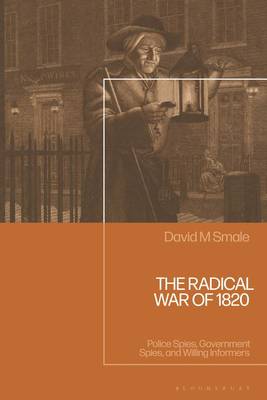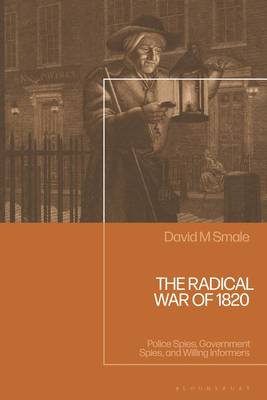
- Afhalen na 1 uur in een winkel met voorraad
- Gratis thuislevering in België vanaf € 30
- Ruim aanbod met 7 miljoen producten
- Afhalen na 1 uur in een winkel met voorraad
- Gratis thuislevering in België vanaf € 30
- Ruim aanbod met 7 miljoen producten
Zoeken
The Radical War of 1820
Police Spies, Government Spies, and Willing Informers
David M Smale
Hardcover | Engels
€ 195,45
+ 390 punten
Omschrijving
This book is a detailed account of the Radical War in 1820s Scotland, highlighting the conditions that led to the revolt, the reaction of the government, and the impact on Scottish society.
David Smale takes readers through the post-1815 mass unemployment, disaffection, and formation of radical groups calling for parliamentary reform, as a prelude to the Radical War. Using a wealth of archival material, this book readjusts existing narratives surrounding the conflict, shifting the focus away from the accounts of paid spies, and centering the little used records of the pioneering 'new police' force. Smale examines how police activities impacted the revolt, from the contrasting aims of pro-reformer and pro-government publications released during the time, to the activities of five 'spy groups' who entered the radical milieu and provided authorities with intelligence on their activities. Concluding with the key events of the revolt, including the Battle of Bonnymuir, and exploring the its after effects, such as the Lord Advocate's conflict with police - this volume provides comprehensive analysis of the Radical War, and places it within a pan-British context.Specificaties
Betrokkenen
- Auteur(s):
- Uitgeverij:
Inhoud
- Aantal bladzijden:
- 280
- Taal:
- Engels
Eigenschappen
- Productcode (EAN):
- 9781350513228
- Verschijningsdatum:
- 10/07/2025
- Uitvoering:
- Hardcover
- Formaat:
- Genaaid
- Afmetingen:
- 156 mm x 234 mm
- Gewicht:
- 566 g

Alleen bij Standaard Boekhandel
+ 390 punten op je klantenkaart van Standaard Boekhandel
Beoordelingen
We publiceren alleen reviews die voldoen aan de voorwaarden voor reviews. Bekijk onze voorwaarden voor reviews.







